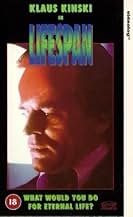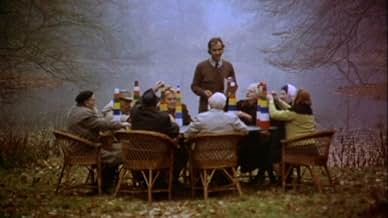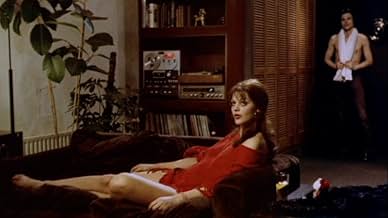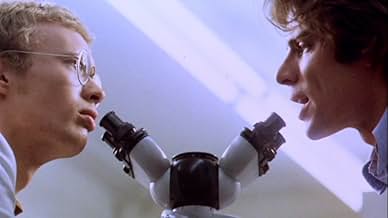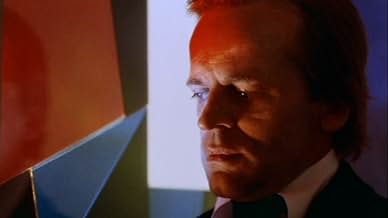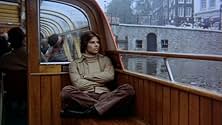Agrega una trama en tu idiomaA doctor trying to develop a serum to lengthen life tries his formula out on the unsuspecting residents of an old-age home.A doctor trying to develop a serum to lengthen life tries his formula out on the unsuspecting residents of an old-age home.A doctor trying to develop a serum to lengthen life tries his formula out on the unsuspecting residents of an old-age home.
- Dirección
- Guionistas
- Elenco
Frans Mulder
- Pim Henke
- (as Franz Mulder)
Dick Scheffer
- Official from ministry of science
- (as Dick Schefer)
- Dirección
- Guionistas
- Todo el elenco y el equipo
- Producción, taquilla y más en IMDbPro
Opiniones destacadas
Lifespan is a paced euro movie that sets your brain thinking after you have watched the end credits. Shot in the Netherlands with some very nice location shooting locations , perhaps because i live in Europe and know Amsterdam a bit i can relate to the film more.
Director Sandy Whitelaw seems with this movie offers Klaus Kinski in a more solid more relaxed part playing the Swiss Man with that European style himself asking and wanting and is prepared to pay for it.
This movie has a fresh brisk pace rather like a Autumn morning in Amsterdam Centrum.
Despite the rather lethargic pace, this is an absorbing conspiracy thriller on an existentialist theme. As it was shot in English, even if most of the voices were eventually re-dubbed at a later stage, Fons Rademakers' heavy accent makes his dialogue hard to understand at times!
Anyway, many have found Hiram Keller's inexpressive performance a detriment to the film but I rather liked it (and so, apparently, does director Whitelaw!); the fact that a lot of the exposition is imparted through narration has been criticized as well, but I also thought this worked very well for the film. Much has also been said about the notorious (and oft-censored) bondage scene involving Tina Aumont (well cast here): actually, it's very discreetly done and pretty short in itself! And though Klaus Kinski doesn't get to exert his acting muscles a great deal, his Mephistophelean presence adds to the film's uniquely disquieting aura. Besides, the Amsterdam setting (and Eddy van der Enden's lugubrious photography of it) is a big plus, as is Terry Riley's electronic score.
Whitelaw's rather choppily edited interview and full-length Audio Commentary (moderated by Mondo Macabro's Peter Tombs) are very interesting: the director explains several points which may not have been very clear and draws attention to the irony which is present in his script. Besides recounting many an amusing anecdote about the production (Kinski turning up on set dressed as a Mexican bandit and Whitelaw having to calmly persuade him that his role of "The Swiss Man" was somewhat different!; Kinski's minimal dialogue was also the result of his dislike of the script, whereupon whole chunks of lines he was supposed to say were unceremoniously thrown out!) and the censorship problems the film encountered (the director tried to convince the U.K. censors that the bondage scene was relevant to the main theme by arguing that this kinky act highlighted a woman's breasts which, by storing milk, are themselves a symbol of immortality!). Whitelaw also puts the unresolved and apparently downbeat ending in the context of the film's theme by saying that a picture about immortality, i.e. the desire that one's life doesn't come to an end, could never have a conventional finish as that would mean it was actually embracing death! Interestingly, he mentions too that Roman Polanski (who was a member of the jury where LIFESPAN won an award) had admired the picture a lot - and this was eventually reflected in his own next film, THE TENANT (1976), to which it bears a striking resemblance plot-wise (though itself based on a work of fiction by Roland Topor, of which Whitelaw was completely unaware at the time)!!
Anyway, many have found Hiram Keller's inexpressive performance a detriment to the film but I rather liked it (and so, apparently, does director Whitelaw!); the fact that a lot of the exposition is imparted through narration has been criticized as well, but I also thought this worked very well for the film. Much has also been said about the notorious (and oft-censored) bondage scene involving Tina Aumont (well cast here): actually, it's very discreetly done and pretty short in itself! And though Klaus Kinski doesn't get to exert his acting muscles a great deal, his Mephistophelean presence adds to the film's uniquely disquieting aura. Besides, the Amsterdam setting (and Eddy van der Enden's lugubrious photography of it) is a big plus, as is Terry Riley's electronic score.
Whitelaw's rather choppily edited interview and full-length Audio Commentary (moderated by Mondo Macabro's Peter Tombs) are very interesting: the director explains several points which may not have been very clear and draws attention to the irony which is present in his script. Besides recounting many an amusing anecdote about the production (Kinski turning up on set dressed as a Mexican bandit and Whitelaw having to calmly persuade him that his role of "The Swiss Man" was somewhat different!; Kinski's minimal dialogue was also the result of his dislike of the script, whereupon whole chunks of lines he was supposed to say were unceremoniously thrown out!) and the censorship problems the film encountered (the director tried to convince the U.K. censors that the bondage scene was relevant to the main theme by arguing that this kinky act highlighted a woman's breasts which, by storing milk, are themselves a symbol of immortality!). Whitelaw also puts the unresolved and apparently downbeat ending in the context of the film's theme by saying that a picture about immortality, i.e. the desire that one's life doesn't come to an end, could never have a conventional finish as that would mean it was actually embracing death! Interestingly, he mentions too that Roman Polanski (who was a member of the jury where LIFESPAN won an award) had admired the picture a lot - and this was eventually reflected in his own next film, THE TENANT (1976), to which it bears a striking resemblance plot-wise (though itself based on a work of fiction by Roland Topor, of which Whitelaw was completely unaware at the time)!!
Apart from featuring Klaus Kinski's name prominently on the DVD-cover, "Lifespan" also caught my attention because there were a lot of Dutch-sounding names in the cast. Indeed so, this bizarre cult co-production entirely takes place in the beautiful city of Amsterdam and the makers admirably took the effort to cast local actors and actresses for the supportive roles. It's a derivative and slow, but nevertheless compelling Sci-Fi/thriller about science's eternal quest for immortality. The ambitious American student Ben Land enrolls into the University of Amsterdam, eager to learn from his idol, Dr. Paul Linden, who allegedly stands on the verge of a medical breakthrough regarding prolonging human life. One day after Land's arrival, however, he finds Linden hanging in a noose from the ceiling (funny how the last thing he said to Land was: "tomorrow I'll be tied up"). With the support of the Dean, the brilliant and stubborn young student deep-dives into Linden's research and discovers successful results on lab mice and dubious experiments in old folks' homes. He also takes over the relationship with Linden's stunningly beautiful mistress Anna and learns about the connection with a mysterious Swiss pharmacist. "Lifespan" is tense and absorbing, but it seriously suffers from a lack of action, and particularly fans of horror & gore will be sorely disappointed! The film was released under the Mondo Macabro label but, like with "Crazy Love", I don't feel it really belongs among the other titles there. As for Klaus Kinski, this was clearly just another easy paycheck for him to cash in. Throughout half of the film, he only stands around and observes Ben Land from a distance. Later on, his role is slightly more extended, and he even gets to fondle ...'s beautiful naked body whilst wearing an antique death mask! You're the man, Klaus!
This movie is hard to categorize. Klaus Kinski has a minor part, so it really can't be considered an important Kinski movie. It is not a horror film, with only one unsettling grave desecration scene. What it is, is an intelligently made sci-fi, that deals with the unique subject of trying to overcome death, by extending lifespans. Beautifully filmed in Amsterdam, the film has sharp editing, and narration that keeps things on track, Hiram Keller is the rather detached American scientist who is trying to unravel a dead colleague's immortality experiments. Klaus Kinski is the Swiss pharmaceutical company owner seeking death control for his own use. Tina Aumont is a love interest for both Keller and Kinski, with her totally gratuitous bondage scene unnecessary except perhaps for some titillating promotion. The ending leaves things hanging uncomfortably, but if you go in with realistic expectations, "Lifespan" will reward. - MERK
"Lifespan" is a partially successful film, beset by too naive dramatic turns and dialogues in view of the serious issues addressed in its plot (a young doctor who aspires to immortality and achieve the status of God, while his words reveal a high level of gerontophobia) and gratuitous eroticism that mostly adds to expose the anatomy of the leading lady, a character that contributes little to the plot. However, the film covers several topics concerning the survival of humanity which are strongly current today, making this drama of scientific anticipation (rather than science-fiction) a visionary film, albeit on a small scale. "Lifespan" addresses the global status of drug factories, which are supposed to alleviate humanity's ills. Today financial gain has been imposed upon people's welfare, supported by a "natural selection" of the fittest based on the individuals' riches, which, as anybody knows, are the results of many persons' greed and hoarding of material goods of our planet, which by nature (and elementary philosophical reasoning) belong to everybody. Moreover, "Lifespan" speaks of vanity rather than mankind's need of immortality. The obsession of the three main males in the plot with the pretty and beautiful Anna is a reflection of man's desire to "entrap" this (so overrated) skin-deep stage of life, while the elderly are called "the almost dead". In this age of mutilating surgeries, pseudo- transformations of gender, anatomy and curves, "Lifespan" is very much in force and delights in the beautiful faces and bodies of its dream cast, which reunites three icons of the counterculture beauty of the 1970s: American Hiram Keller, French Tina Aumont and West German Klaus Kinski. If one is a bit tolerant of the limitations I have noted, you will find a high level of inspiration that often reaches moments of fascination, that, although not maintained throughout the duration of the film, constitute a time capsule of an era, of a way of thinking and seeing the world that anticipated how our own would be. Recommendable.
¿Sabías que…?
- TriviaAt one point in the film, Tina Aumont is put into some "DNA helix" bondage as part of some consensual lovemaking with Dr. Land. Some bondage fans believe this is the first appearance of Japanese shibari bondage in a mainstream Western film.
- Versiones alternativasWhen released on VHS in 1987 in the UK, the BBFC made cuts of 1 minute 14 seconds to achieve an '18' rating. These cuts were waived when released again on video on 22 May 1995.
Selecciones populares
Inicia sesión para calificar y agrega a la lista de videos para obtener recomendaciones personalizadas
- How long is Lifespan?Con tecnología de Alexa
Detalles
- Fecha de lanzamiento
- Países de origen
- Idioma
- También se conoce como
- Lifespan - Das Geheimnis des Lebens
- Locaciones de filmación
- Productora
- Ver más créditos de la compañía en IMDbPro
- Tiempo de ejecución1 hora 17 minutos
- Mezcla de sonido
- Relación de aspecto
- 1.85 : 1
Contribuir a esta página
Sugiere una edición o agrega el contenido que falta

